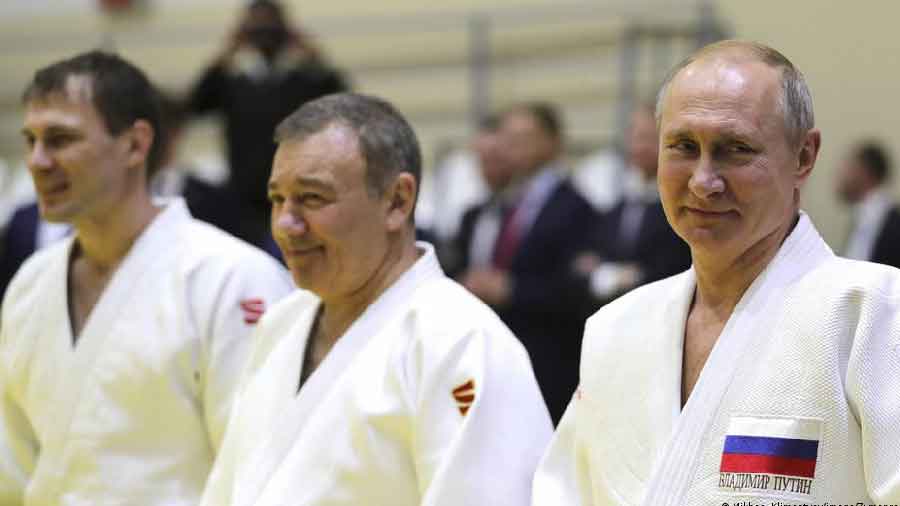Russia's invasion of Ukraine has prompted many sporting bodies to shut out Russian and Belarusian athletes from global events. DW looks at the bans, and in which sports athletes from both countries may still compete.
When Russian and Belarusian athletes were excluded from the Winter Paralympics in Beijing in March, Russia organized an alternative event for them in Khanty Mansiysk in Siberia. Athletes from Armenia, Kazakhstan and Tajikistan also took part in the competitions.
It had the air of an act of defiance by Russian President Vladimir Putin, who once enjoyed basking in the glow of his country's success in international sporting competitions.
Since then, Russian and Belarusian athletes have been shut out from a growing number of international competitions — far too large for Putin to be able to come up with replacement events for each and every one of them.
What is the basis for the bans on Russia and Belarus?
On February 28, four days after Russia launched its invasion of Ukraine, the Executive Board of the International Olympic Committee announced its recommendation "that International Sports Federations and sports event organisers not invite or allow the participation of Russian and Belarusian athletes and officials in international competitions."
Federations that are unable to do so, the IOC added, should only allow athletes from Russia or Belarus to compete under neutral status, not for their country.
IOC President Thomas Bach repeatedly stressed that these were not sanctions, but protective measures for the "integrity of competitions" as well as for the athletes from Russia and Belarus. Their safety could not be guaranteed "because of the deep anti-Russian and anti-Belarusian feelings in so many countries following the invasion," he said at an online IOC meeting in May. By taking this position, the IOC said it is upholding its pledge of political neutrality enshrined in the Olympic Charter, its book of rules.
As early as February 25, the day after the Russian invasion began, the IOC called on "all International Sports Federations to relocate or cancel their sports events currently planned in Russia or Belarus."
Have all federations followed the IOC recommendations?
Most sports federations have complied with the IOC's recommendations. The national football teams of both countries were banned from qualifying for the 2022 Men's World Cup in Qatar and the 2023 Women's World Cup in Australia and New Zealand. Both countries will be absent from both events.
European football's governing body UEFA has excluded not only the national teams but also all Russian and Belarusian clubs from European competitions. The Court of Arbitration for Sport in Lausanne rejected Russian appeals against the exclusion.
The men's Ice Hockey World Championship in Finland in May was held without teams from Russia and Belarus — as were the World Swimming Championships in Budapest in June and now the World Athletics Championships in Eugene, Oregon.
All international sports competitions planned in Russia or Belarus have been canceled or postponed. The men's Champions League Final in May was hosted by Paris instead of St. Petersburg. The World Swimming Short Course Championships in December have been moved from Kazan in Russia to Melbourne, Australia.
Which sports still allow Russians and Belarusians to compete internationally?
In cycling and tennis, Russia and Belarus are excluded only when it comes to teams. Individual athletes are still allowed to participate but are classified as "neutral" participants. The captain of the German professional cycling team Bora-hansgrohe, Russian Alexander Vlasov, for example, was allowed to compete in this year's Tour de France.
At the French Open in Paris in May, Russia's Darja Kassatkina made it to the semifinals. At Wimbledon, however, the organizers excluded players from Russia and Belarus — under pressure from the British government and against the wishes of the men's and women's professional tours.
At the last Grand Slam tournament of the year, the US Open in New York at the end of August, professionals from both countries will be allowed to participate again, including defending champion Daniil Medvedev from Russia. The organizers said they wanted to avoid "holding the individual athletes accountable for the actions and decisions of their governments."
Theoretically, drivers from Russia and Belarus would have been allowed to compete as "neutral" drivers in Formula 1 as well. However, the contract of the only Russian in the driver lineup, Nikita Mazepin, was terminated by the racing team shortly before the start of the season in March. F1 has also removed the Sochi Grand Prix from the 2022 schedule, and canceled plans for annual races to be held in St. Petersburg from 2023 to 2025.
In judo, athletes from Russia and Belarus are still allowed to compete in international competitions under the flag of the world federation, the International Judo Federation.
"Athletes are not to be punished for issues which are out of their control," the IJF explained.
Russian judokas competed in the Grand Slam competition in June in Ulan Bator, Mongolia, which counted toward Olympic qualification for the 2024 Games in Paris. Ukraine boycotted the competition in protest.
How long will the sporting bans last?
Sports federations are leaving open how long they will maintain the isolation of Russia and Belarus, depending largely upon how long Russia's war on Ukraine continues. But it's already clear that many of the bans will have an impact in 2023.
British IOC member, Sir Craig Reedie, also believes it is unlikely that athletes from Russia or Belarus will participate in the 2024 Summer Olympics in Paris.
"My guess is that the general feeling would be that they should not qualify," Reedie told Britain's Guardian newspaper earlier this month.
From Deutsche Welle Newsfeed











